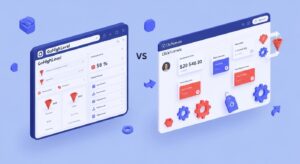PPC Strategy for Small Businesses in 2025 – How to Compete with Big Brands

Introduction
Small businesses often believe PPC is a game only big brands can win. But that’s no longer true.
In 2025, even with modest budgets, a smart PPC strategy for small businesses can bring consistent leads, predictable ROI, and faster growth than traditional marketing ever could.
Let’s break down exactly how local and growing businesses can run PPC like the pros — without wasting a single dollar.
1. Define Clear Goals Before Spending a Dime
Before launching your first campaign, know exactly what you want to achieve.
Ask yourself:
- Do you want more website traffic or phone calls?
- Are you focusing on brand awareness or direct sales?
- What’s your monthly ad budget?
Clear goals help shape your targeting, bidding, and creative strategy. The best PPC campaigns are built on precision, not guesswork.
2. Focus on Local Targeting
Small businesses win by staying local.
Google Ads lets you target users by:
- City, ZIP code, or radius around your business
- Device type (mobile for local users)
- Ad scheduling (run ads during open hours)
This ensures your budget only reaches people likely to buy from you — not someone across the country who’ll never convert.
3. Use Long-Tail Keywords to Lower Costs
Don’t chase expensive, generic terms like “marketing agency” or “plumber.”
Instead, go after specific, intent-rich long-tail keywords like:
- “emergency plumber near me”
- “affordable ppc management for small business”
- “digital marketing for local restaurants”
These keywords have lower competition, higher intent, and better ROI potential.
4. Optimize Ad Copy for Relevance and Action
Your ad copy should speak directly to your audience’s problem.
Example:
“Need More Local Customers? Get Results-Driven Google Ads Setup Today.”
Include a clear call to action — Book Now, Get a Quote, Call Today.
Local intent + urgency = clicks that convert.
5. Build Landing Pages That Convert
The landing page is where your ad turns into a customer.
Every great PPC strategy includes optimized landing pages with:
- One clear CTA (e.g., “Request a Free Estimate”)
- Local references (city names, maps, testimonials)
- Fast load times
- Mobile-friendly layout
💡 Pro Tip: Use Google Tag Manager to track every click, call, and form submission.
6. Start Small, Then Scale
The beauty of PPC is that you can start small and grow fast.
Begin with a daily budget you’re comfortable testing (even $20/day works).
Analyze which keywords and ads perform best, then double down on those.
Optimization beats overspending — every time.
7. Use Retargeting to Stay Top of Mind
Not every visitor converts immediately.
Retargeting helps small businesses re-engage people who already visited their website.
Whether through Google Display Ads or YouTube remarketing, showing up again builds trust and increases conversions by up to 70%.
8. Partner with Experts When You’re Ready to Scale
DIY PPC is great for learning — but scaling requires expertise.
Professional PPC strategists can help you:
- Optimize campaigns weekly
- Implement advanced tracking
- Reduce CPC through better Quality Scores
- Scale campaigns while maintaining profitability
👉 Ready to take your PPC to the next level? Visit BestPPCFirm.com — your go-to partner for small business PPC growth.
FAQs
1. What’s the best PPC strategy for small businesses?
Focus on local targeting, long-tail keywords, strong ad copy, and optimized landing pages.
2. How much should a small business spend on PPC?
Start with a manageable daily budget (around $20–$50/day) and scale gradually based on ROI.
3. Can small businesses compete with big brands in PPC?
Absolutely. Smart targeting, retargeting, and data-driven optimizations level the playing field.




